MarEx Exclusive: Interview with Chris Fischer, Founding Chairman & Expedition Leader, OCEARCH
Chris Fischer is an adventurer. He’s spent the last decade on a quest to become the voice of the world’s oceans by creating awareness of marine life and influencing policy that impacts oceans. Chris led his first expedition in 2007 and has since led 15 expeditions covering more than 100,000 nautical miles with a team of researchers whose goal is to unlock the mysteries surrounding the life history of great white sharks and other ocean giants. Through generous support from companies like Caterpillar, his nonprofit OCEARCH has been able to break through barriers and generate groundbreaking data on the ocean’s apex predators.
From March to May 2012 Fischer led an historic shark research expedition off South Africa where his OCEARCH team captured, tagged and released over 40 great whites, including the first ever to be captured and released alive in South Africa. Working onboard their 126-foot research vessel, appropriately named OCEARCH, Fischer’s team of scientists conducts live research and constantly improves its data-gathering methods so that policy makers and the public will have the best and most accurate information available.
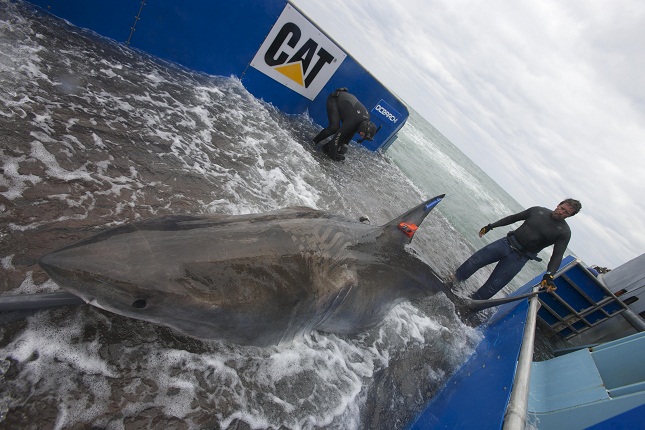
Sharks play a crucial role in maintaining the delicate balance of the ocean’s ecosystem and affect all levels of the ocean’s food chain. If sharks were removed or depleted, Fisher says, a “catastrophic domino effect” would occur with a lasting negative impact on the world’s oceans. MarEx had a chance to catch up with Chris Fischer and learn more about this self-proclaimed adventurer and steward of the ocean.
“Go out! Discover the world’s oceans and be a responsible steward of the seas.”
MarEx: What inspired you to begin OCEARCH?
Fischer: Everything started with recreational fishing. I grew up fishing with my dad and friends in Kentucky. We used to chase small- and large-mouth bass for hours at a time. My parents always made the outdoors super-accessible, which I’m very thankful for. I founded OCEARCH after realizing that I needed a nonprofit to advocate for the future of the oceans, leverage the new data we were creating to affect policy, and develop dynamic education programs based around the real-time tracking of great whites.
MarEx: Who were your role models?
Fischer: Zane Grey inspired me to become an explorer. He explored remote fisheries and told his story to the world through novels. My mission was to pour the world’s oceans into people's homes so they could have their own relationship with the ocean and thus care about its future. When it comes to OCEARCH the organization, my greatest influence was definitely my father, George Fischer. Why pioneer research, gather new data, and stop there? So we needed a nonprofit to advocate. OCEARCH is an acronym combining “ocean” and “research,” and it is the vehicle we use to advocate, educate and inspire.
MarEx: What were you doing before you started OCEARCH?
Fischer: I managed sales in Asia and the Pacific Rim for our family business.
MarEx: What is your research goal?
Fischer: We don't have enough data on the oceans’ giants to ensure they have a robust future. One might ask: "Why is that important?" It’s important because sharks are the lions of the ocean. They are the balance-keepers. If we lose them, there is no viable path forward for the ocean or the planet. We need a lot of sharks in the ocean if we want to have a lot of fish in the ocean. So many people rely on this resource for food that, if we lose it, humanity and the planet are in trouble.
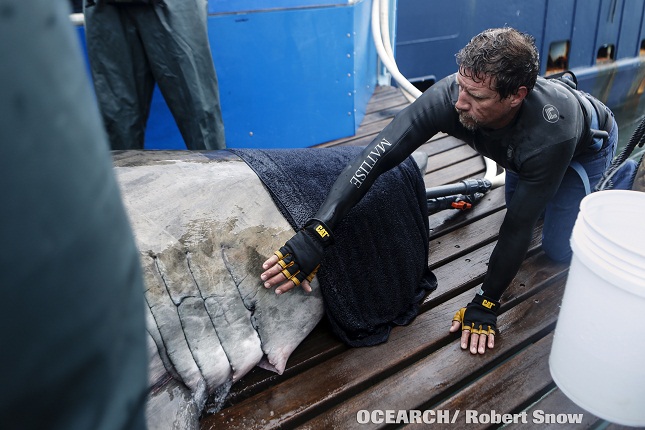
MarEx: As a nonprofit you rely on donations from industries that are impacted by your research. Who have been your biggest supporters?
Fischer: Caterpillar, Costa, Yeti and Landry’s are our biggest supporters, along with Yamaha, Contender, SAFE Boats and Mustad. CAT funds our exploration around the world, and their Global Dealer Network supports our efforts anywhere and anytime. They enable us to do what we do. Costa funds our film-making so we can share exploration and research with people globally in near real-time through the OCEARCH YouTube page and our daily films.
Landry's is our education partner. They are writing a K-12 STEM (science, technology, engineering, and math) curriculum around the real-time OCEARCH Global Shark Tracker. This will allow students around the world to follow sharks in real-time and have that data integrated into their math, geography, geology and science classes. It is going to make science fun and interesting to our kids. We must succeed at this because these are the skills our children are going to need to have a bright future.
Yeti provides financial support for our field research and outreach as well as products (coolers) onboard the vessel. Yamaha, Contender, SAFE Boat and Mustad all provide critical product support.
MarEx: What have you learned from this experience?
Fischer: Total relentless commitment is required to do something great. You cannot waiver, regardless of the challenge. Also, inclusiveness is inspiring – it takes everybody to achieve the impossible.
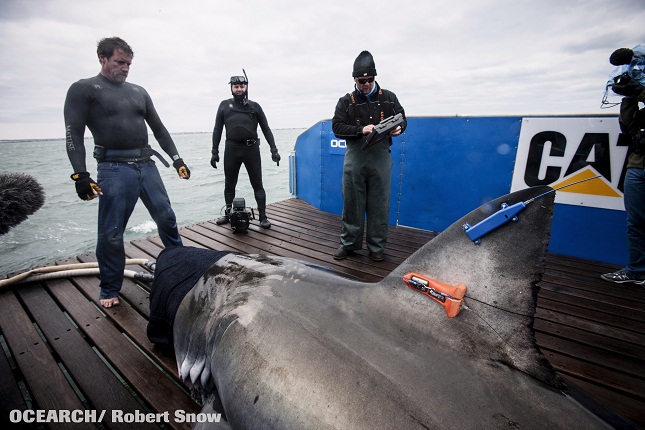
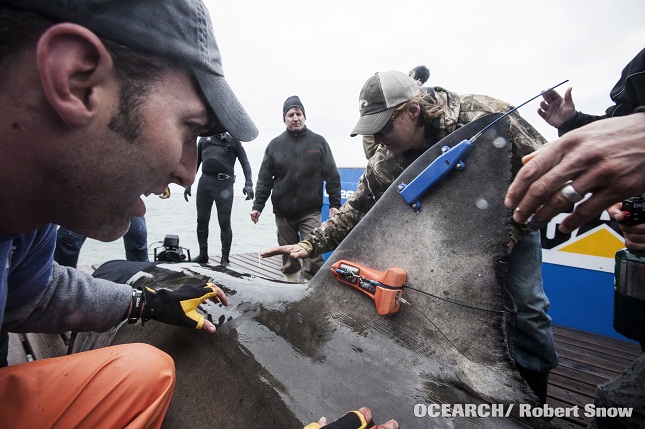
MarEx: How can corporations and businesses, particularly the commercial maritime industry, benefit from the research you’re conducting?
Fischer: We all work on the water and operate our business to support the economy, our families and the planet. All of us want this resource to have a bright future for our children, and we can give back a small amount to make sure that happens. Hopefully, Caterpillar’s example will inspire other large businesses to take a small percentage of their time and profits to ensure that for our kids.
MarEx: What has been the most surprising discovery regarding sharks and their behavior?
Fischer: The fact that they utilize the entire ocean. Their range is massive. They’re the balance-keeper, the lion of the ocean. There is no other way to have a sustainable ocean if we lose the sharks.
MarEx: What is the most satisfying part of your job?
Fischer: Doing things that have never been done before over and over to create a brighter future for the planet and then giving all the content and data away for free in an effort to inspire global change.
MarEx: Your vessel – the M/V OCEARCH – takes you and your crew on expeditions in some of the most remote areas on earth, often home to extreme conditions. What equipment onboard do you rely on the most?
Fischer: We are powered by Caterpillar engines and generators. This equipment allows us to travel to the far corners of the earth to support any country or research team that needs our help. Once we arrive at a location, the global Caterpillar dealer network allows us to execute. In the past we had really struggled with operating in remote places. Those days are over. CAT is everywhere, so we can now help anyone, anytime, in any place.
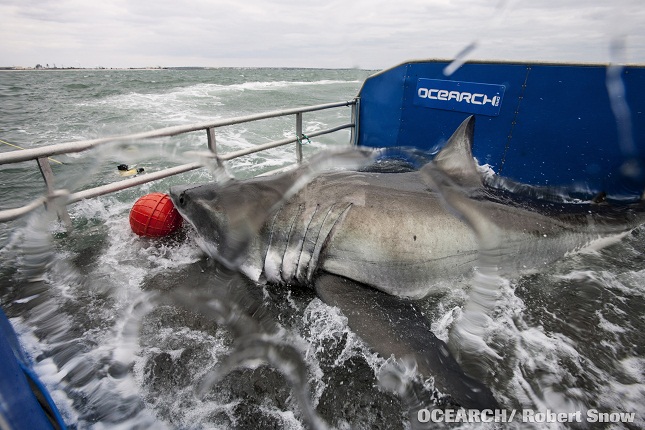
MarEx: You have an hydraulic lift onboard that was custom-designed to handle sharks up to 75,000 pounds. Have you had a shark that large?
Fischer: The lift actually has a 75,000-pound capacity. We had several sharks in the lift over 4,000 pounds. The lift and accompanying research platform make the impossible possible. They allow us to give the brightest scientists in the world access to the sharks for 15 minutes to advance their science and then release them alive so we can solve the puzzle of multiyear migrations. This is how we have been able to identify breeding sites and nurseries. It's important to uncover these locations so we can ensure the sharks succeed in these areas and have a robust future.
MarEx: How many sharks are you currently tracking?
Fischer: Over 30. The females have a two-year migratory cycle while the male has a one-year cycle. The range of the shark is massive as you can see on our Global Shark Tracker.
M/V OCEARCH
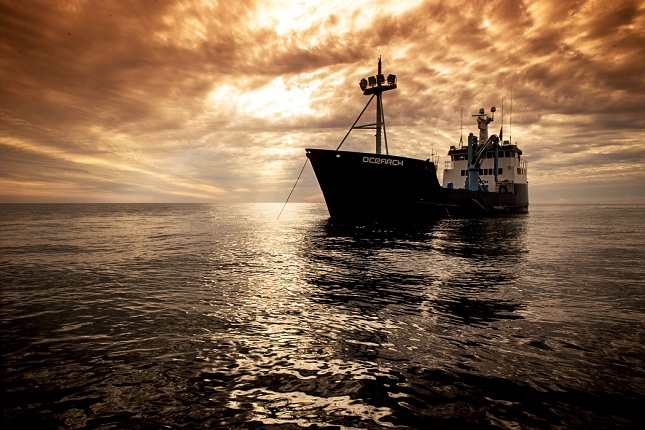
The OCEARCH team sets sail on a 126-ft former crabbing vessel equipped with a custom 75,000-pound capacity hydraulic lift and research platform that can hold a 5,500-pound shark. Two CAT generators, a 4.4 99kw and a 6.6 125kw, power everything onboard, including a marine laboratory. In the summer of 2012 the M/V OCEARCH was fitted with two new 3412 CAT engines, giving the researchers an even greater sense of dependability on expeditions.
